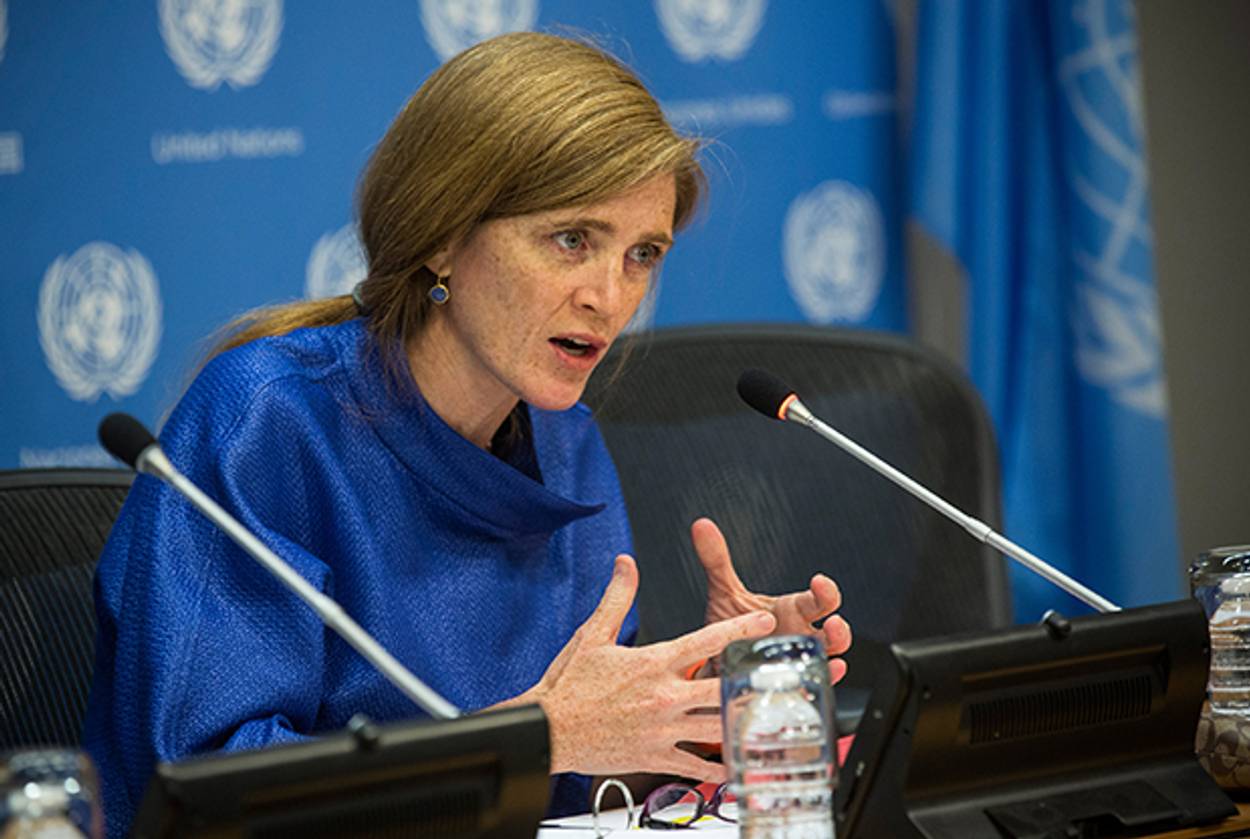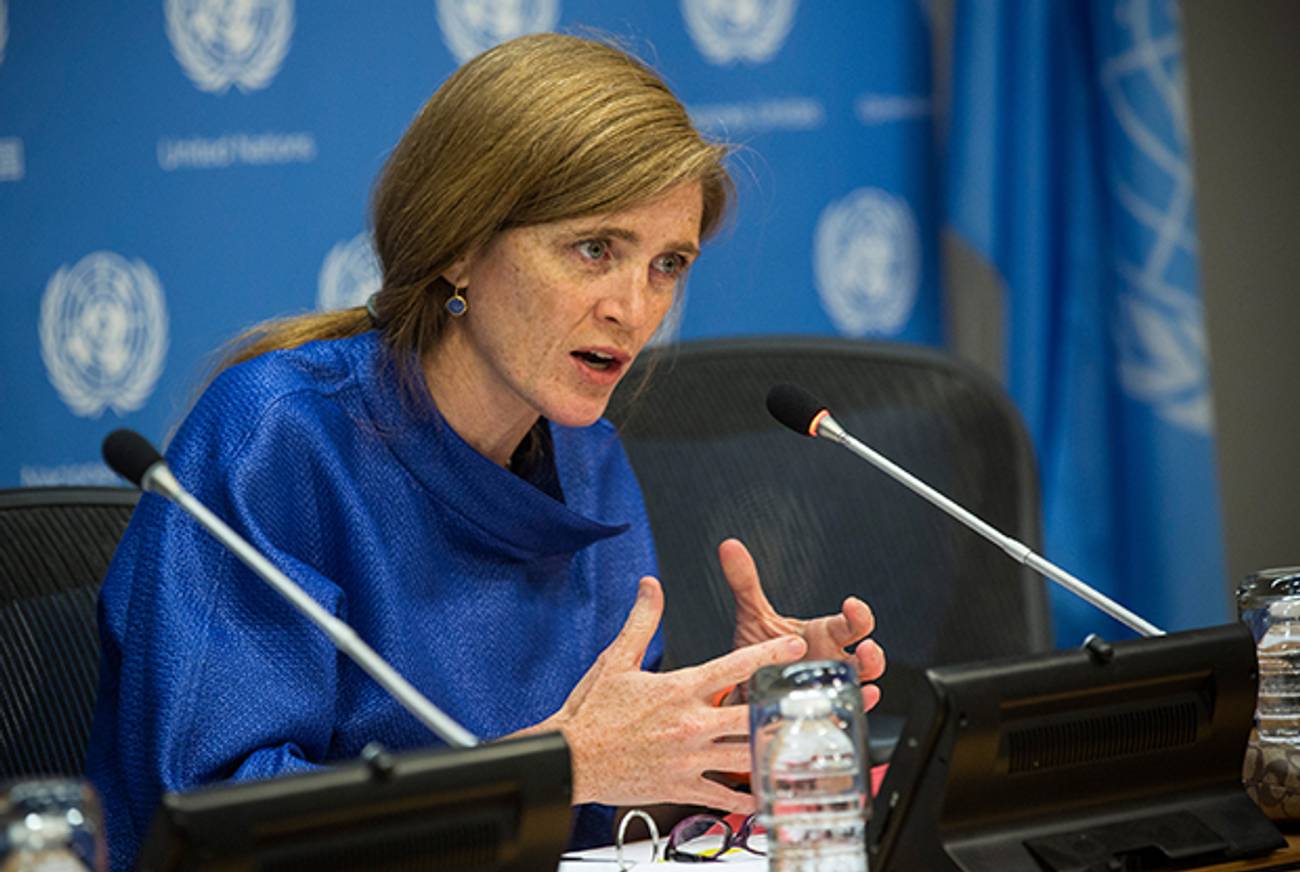Samantha Power Knocks European Nations for Ditching Anti-Semitism Conference
At Berlin confab, Ambassador to the U.N. warns of rising anti-Semitism




Yesterday, one of America’s top diplomats did something decidedly undiplomatic. At the Organization for Security and Cooperation in Europe’s Berlin Conference on Anti-Semitism, Samantha Power used her keynote address to call out the nations of Europe for failing to attend, just as anti-Jewish incidents have spiked across the continent. “When leaders show up, nations take notice,” the U.S. Ambassador to the United Nations said. “It is also why, frankly, it is deeply concerning that even as anti-Semitism is rising in Europe, a third fewer countries are participating in the 2014 conference than took part in the 2004 conference, and only one in three of the countries that sent a foreign minister or other cabinet level official in 2004 has sent one at that level to this conference.”
Just to make sure the world got the message, Power, a Pulitzer Prize-winning human rights activist and close adviser to President Obama, chose this portion of her speech to blast out to her 120,000 Twitter followers after she delivered it:
1/2 Despite antiSemitism ↑, disappointing ↓ in Euro attendance: 1/3 fewer nations attend & 1/3 who sent cabinet official in `04 sent 1 today
— Samantha Power (@AmbassadorPower) November 13, 2014
2/2 Doesn’t anti-Semitism—at the very least—merit same show of solidarity & commitment from govs today as it did a decade ago? #BerlinPlus10
— Samantha Power (@AmbassadorPower) November 13, 2014
Power’s remarks, along with the prestigious presidential delegation that accompanied her to the conference, signaled that the U.S. has stepped up its game–at least rhetorically–when it comes to tackling the issue of European anti-Semitism. Previously, Secretary of State John Kerry had made brief public reference to the problem, but Power’s speech marked the first time a top member of the Obama administration had spoken at length on the subject.
“Make no mistake,” she told the conference, “we have a problem.” Power cited a disturbing EU survey that found that 25 percent of European Jews report having experienced anti-Semitic attacks or harassment in the last year. And she emphasized that anti-Semitism is not a parochial Jewish problem, but a societal one. “Rising anti-Semitism is rarely the lone or the last manifestation of intolerance in a society,” she said. “Quite the contrary, it is often the canary in the coal mine for the degradation of human rights more broadly. When the human rights and fundamental freedoms of Jews are repressed, the rights and freedoms of other minorities and other sectors are often not far behind.”
Among other recommendations, Power pressed European nations to appoint special envoys for combating anti-Semitism, something the U.S. has already done. The American envoy, Ira Forman, was in attendance at the conference, and expressed satisfaction at Power’s forthright comments. “It was very powerful, very well-received, and I thought a very strong call by the United States that out of this conference has to come some real results,” he said. “This is the very viability of Jewish communities at stake here.”
“It’s too costly to be Jewish,” he continued. “Costly in terms of worrying about your children being attacked at school. It’s costly in terms of worrying about going to a synagogue or a Jewish event and being worried about violence. We had students who talked about how difficult it is now to be openly Jewish on campus.”
Forman noted that much of this testimony disproved the canard that events in the Middle East and Israel somehow cause anti-Semitism. “What they’re describing is not about Gaza. Gaza was essentially a spike in an already-raised level of anti-Semitism, and sometimes it’s the things that have happened after and before Gaza that are most disconcerting.” He pointed to a January march of 17,000 anti-government protesters in Paris which devolved into mass chants of “Jew, France is not yours!” and “Jews out of France!” The rally “literally brought up memories of the thirties for people,” he said.
Most heartening for Forman was the composition of the American delegation–particularly its many non-Jewish members, including the NAACP, the Human Rights Campaign and the American Islamic Congress, along with civil rights leaders like Wade Henderson, the president of the Leadership Conference on Civil and Human Rights.
“As Henderson said,” Forman recalled, “this is not just a Jewish issue, and it shouldn’t be just a Jewish issue. It’s an issue of human rights and democracy, and it’s an issue that all people who care about human rights need to rally around.”
Previous: New Survey: Europe has a Jewish Problem
‘Jew, France is Not Yours,’ Chant Anti-Government Demonstrators in Paris
Yair Rosenberg is a senior writer at Tablet. Subscribe to his newsletter, listen to his music, and follow him on Twitter and Facebook.